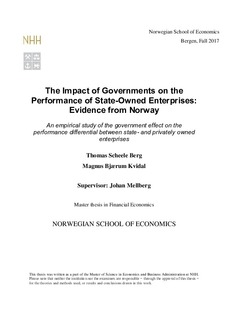The impact of governments on the performance of state-owned enterprises : evidence from Norway : an empirical study of the government effect on the performance differential between state- and privately owned enterprises
Master thesis
Permanent lenke
http://hdl.handle.net/11250/2487861Utgivelsesdato
2017Metadata
Vis full innførselSamlinger
- Master Thesis [4372]
Sammendrag
This thesis investigates how the performance differential between state-owned enterprises
(SOEs) and privately owned enterprises (POEs) is affected by different governments. Theory
suggests that through their ability to elect the Board of Directors, the government can influence
corporate governance or even utilize SOEs as vehicles to promote political objectives. By
using the performance differential as a measure of the extent of deviation from profit
maximizing behavior, we compare governments prior to and after three elections in Norway.
By examining these elections separately, the research robustness is increased.
Historically, SOEs have not been selected randomly, and generally differ significantly from
POEs. Consequently, we apply inverse probability of treatment weighting (IPTW) using
propensity scores in order to construct a comparable control group. Using the weighted control
group, we have utilized a difference-in-differences model specification to compare the
governments. Visual inspections suggest that SOEs and the weighted POEs exhibit parallel
trends prior to treatment and we resultantly argue that the results can be interpreted causally.
The results show no evidence that any of the three government changes caused a significant
change in the profitability of SOEs compared to POEs. The small treatment group contributes
to big standard errors of the coefficients, making it unlikely that we would retrieve statistically
robust results even if there actually existed a causal relationship.
